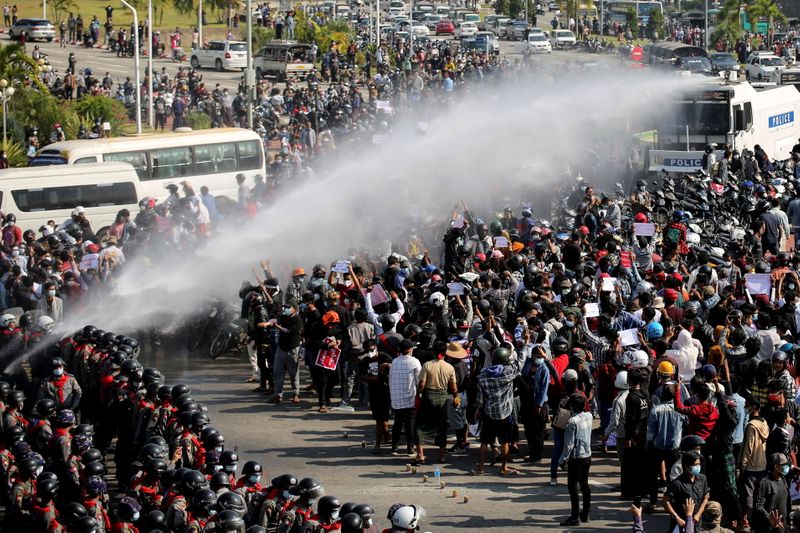(Reuters) – Myanmar police used force today to disperse protests against military rule and one woman was in critical condition and not expected to survive after being shot in the head with a bullet, a doctor said.
Police fired guns, mostly into the air, and used water cannon and rubber bullets to try to clear protesters in the capital Naypyitaw, and four people were taken to hospital with what doctors initially said they believed were wounds caused by rubber bullets.
One of them, a woman, had what was most likely a fatal head wound, said a doctor who declined to be identified. The bullet could be seen lodged in her in an X-ray, the doctor said.
“She hasn’t passed away yet, she’s in the emergency unit, but it’s 100% certain the injury is fatal,” the doctor, who said senior colleagues involved in her treatment had assigned him to speak to the media, told Reuters.
“According to the X-ray, it’s a live bullet.”
Neither police nor the hospital responded to a request for comment.
A man had a chest wound but was not in critical condition. It was not clear if he was hit with a bullet or rubber bullet, the doctor said.
Protesters have taken to the streets in cities and towns in the largest demonstrations in Myanmar for more than a decade against a Feb. 1 military coup that ousted the elected government of veteran democracy campaigner, Aung San Suu Kyi.
The unrest has revived memories of almost half a century of direct army rule, and spasms of bloody protests against it, until the military began a process of withdrawing from civilian politics in 2011.
Suu Kyi’s party won a 2015 election but the transition to democracy was brought to a halt by the Feb. 1 coup that ousted her government as it was preparing to begin its second term after her National League for Democracy (NLD) swept a Nov. 8 election.
The military cited election fraud as justification for its takeover. The electoral commission dismissed accusations of fraud.
Earlier, witnesses said police fired guns into the air in Naypyitaw as a crowd refused to disperse. Police then fired water cannon at the protesters, who responded with stones, the witness said.
Video footage posted on social media apparently of the woman who was killed, showed her with some other protesters by what appeared to be a bus-stop shelter some distance from a row of riot police as a water cannon sprayed and several shots could be heard.
The woman, wearing a motorbike helmet, suddenly collapsed. Pictures on social media of her helmet showed what appeared to be a bullet hole.
Reuters was not able to verify the video footage or photographs.
PROMISE OF DEMOCRACY
Earlier, video from the central town of Bago showed police confronting a crowd and blasting them with jets from water cannon.
Police arrested at least 27 demonstrators in the second-biggest city of Mandalay, domestic media reported.
Promises on Monday from junta leader General Min Aung Hlaing to eventually hold a new election in his first address since seizing power drew scorn. He repeated unproven accusations of fraud in the election.
Min Aung Hlaing said the junta would form a “true and disciplined democracy”, different to previous eras of military rule, which brought years of isolation and poverty.
“We will have a multiparty election and we will hand the power to the one who wins,” he said.
He gave no time frame but the junta has said a state of emergency would last one year.
State media signalled possible action against the protests on Monday when it said the public wanted rid of “wrongdoers”.
Orders banning gatherings of more than four people and a curfew from 8 p.m. to 4 a.m. have been imposed on Yangon and Mandalay.
A growing civil disobedience movement affecting hospitals, schools and government offices shows no sign of ending but the crowds in Yangon appeared smaller on Tuesday than the previous day.
“The main thing is we don’t want a coup,” said a 24-year-old woman protester in Yangon. “If we young people don’t come out who will?”
Activists are also seeking the abolition of a 2008 constitution drawn up under military supervision that gave the generals a veto in parliament and control of several ministries, and for a federal system in ethnically diverse Myanmar.
Western governments have widely condemned the coup, although there has been little concrete action to press the generals.
The Philippines on Tuesday issued a second statement on Myanmar, calling for “complete restoration of the status quo” – one of the few among Myanmar’s Southeast Asian neighbours to comment on the military intervention.
New Zealand has suspended all high-level political and military contact and will ensure aid does not benefit the military and impose a travel ban on its leaders.
The U.N. Security Council has called for the release of Suu Kyi and others. The U.N. Human Rights Council will hold a special session on Friday to discuss the crisis.
Suu Kyi won the Nobel Peace Prize in 1991 for campaigning for democracy and spent nearly 15 years under house arrest.
The 75-year-old faces charges of illegally importing six walkie-talkies and is being held in detention until Feb. 15. Her lawyer said he has not been allowed to see her. The U.S. State Department said it tried to reach her but was denied.
Suu Kyi remains hugely popular at home despite damage to her international reputation over the plight of the Muslim Rohingya minority.






